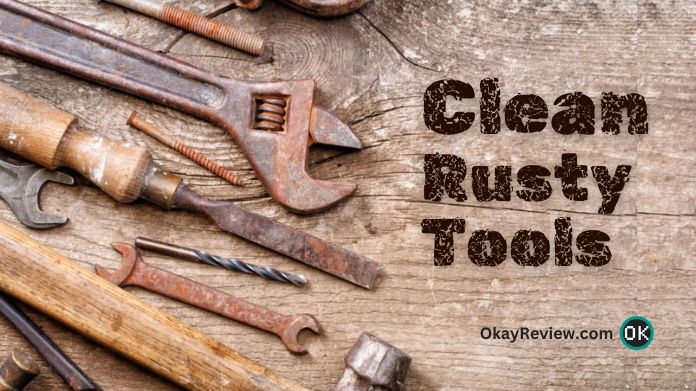Rust can be a menace for anyone who owns tools. It can impair the functionality, safety, and durability of your important equipment, so we have to clean rusty tools.
From hammers and screwdrivers to lawn shears and saws, every tool is susceptible to the devastating effects of rust.
However, keeping your tools in excellent condition is important for both performance and durability. This guide provides practical methods for to clean rusty tools and restoring your tools to their former glory.
Table of Contents
Understanding Rust: The Basics
Rust, scientifically known as iron oxide, occurs when iron or steel is exposed to oxygen and moisture over time.
Environmental conditions such as humidity, salt water, or acid exposure can hasten the oxidation process, corroding the metal quickly.
Tools stored in wet circumstances or often used outside are especially prone to corrosion. Understanding how rust develops and affects your instruments is the first step toward avoiding and treating corrosion.
Best Way to Clean Rusty Tools
Method 1: Mechanical Removal
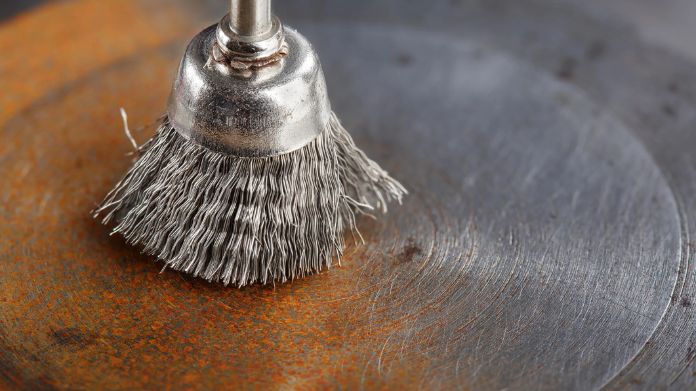 Mechanical removal means manually clean rusty tools or instruments. This can be accomplished using a wire brush, sandpaper, or steel wool.
Mechanical removal means manually clean rusty tools or instruments. This can be accomplished using a wire brush, sandpaper, or steel wool.
It works well with huge flakes of rust and can reach crevices where rust hides. Wear gloves and operate in well-ventilated areas to prevent breathing rust particles.
Begin with coarser materials like a wire brush to remove the bulk of the rust, then switch to finer sandpaper to smooth out the surface.
Method 2: Natural Remedies
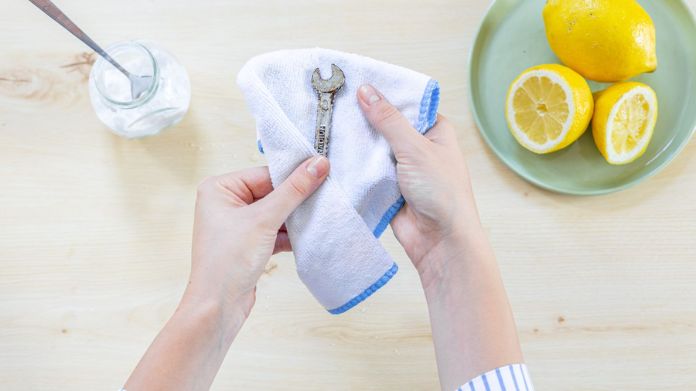 Natural remedies provide a safer and more ecologically friendly alternative to harmful chemicals. Common household products like vinegar, baking soda, and lemon juice may be quite helpful.
Natural remedies provide a safer and more ecologically friendly alternative to harmful chemicals. Common household products like vinegar, baking soda, and lemon juice may be quite helpful.
For example, soak small instruments in white vinegar for up to 24 hours before scrubbing the rust off. A mixture of baking soda and water can be applied to rust areas and let settle before cleaning.
Lemon juice and salt may also be used to remove rust spots; the acid in the lemon juice removes the rust, while the salt serves as a mild abrasive.
Method 3: Chemical Solutions
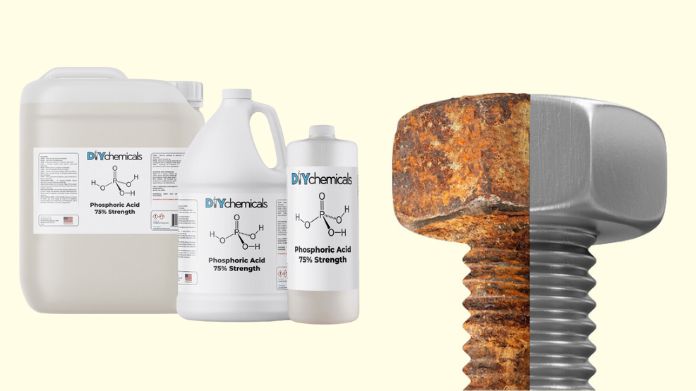 When natural solutions are not enough, commercial rust removers can come to the rescue. These products usually contain phosphoric or oxalic acid, which dissolves the rust.
When natural solutions are not enough, commercial rust removers can come to the rescue. These products usually contain phosphoric or oxalic acid, which dissolves the rust.
It is critical to carefully follow the manufacturer’s recommendations and wear proper safety equipment such as gloves and goggles.
Apply the chemical solution to the rusted area, allow it to sit for the recommended time, and then scrub or wipe away the residue. Always neutralize the acid according to the instructions, often with water or baking soda.
Method 4: Unconventional Tools
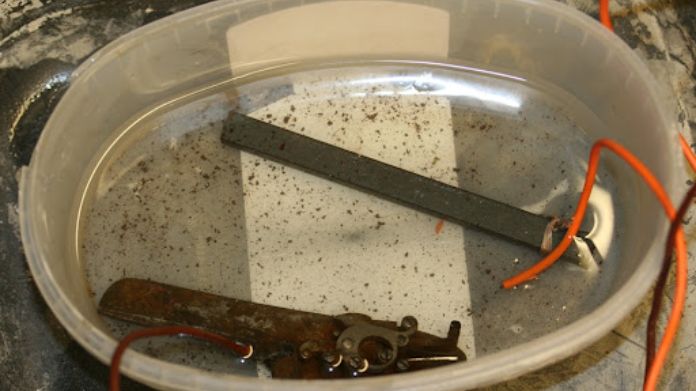 For individuals who prefer to explore, odd instruments like potatoes may be surprisingly successful. Potatoes contain oxalic acid, which helps to dissolve rust.
For individuals who prefer to explore, odd instruments like potatoes may be surprisingly successful. Potatoes contain oxalic acid, which helps to dissolve rust.
Sliced potato in half, season the sliced side with salt or dish soap, then massage it over the rusty area. Another novel approach is electrolytic rust removal, which includes utilizing a low electric current and a baking soda solution to reverse the rusting process.
These techniques are especially effective for delicate or complicated equipment where abrasive treatments might cause damage.
Method 5: Prevention and Maintenance
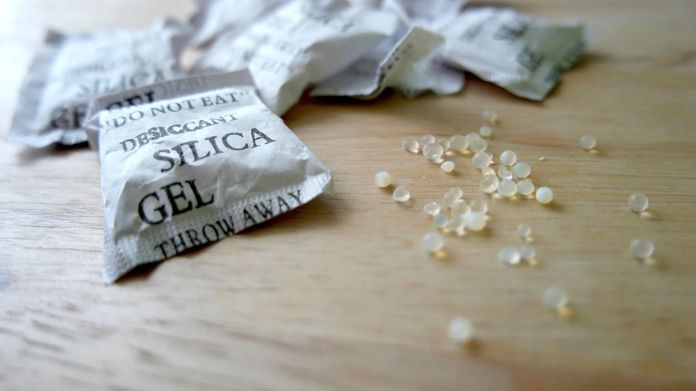 The best way to deal with rust is to prevent it from forming. Keep tools dry and clean. Use silica gel packets to absorb moisture from toolboxes.
The best way to deal with rust is to prevent it from forming. Keep tools dry and clean. Use silica gel packets to absorb moisture from toolboxes.
Clean and check your tools on a regular basis, and add a little layer of oil or silicone-based spray to keep them moisture-free.
If rust appears, dealing with it right away will avoid additional damage and preserve your tools in operating order.
How to Prevent Tools From Rusting?
Protecting tools against rust is crucial for anybody who values their equipment. Here’s some practical advice I’ve found to be effective over the years, as well as some tried-and-true methods for keeping your metal equipment in excellent operating order.
- Keep Them Dry: Always dry your tools after use, especially if they’ve been exposed to moisture.
- Store Properly: Use a toolbox or storage system that protects them from the elements. Hanging tools can also prevent water accumulation.
- Use Silica Gel Packs: Place silica gel packs in your toolbox to absorb moisture and protect tools from humidity.
- Apply Protective Coatings: Lightly lubricate your tools with machine oil or a silicone-based spray to provide a moisture barrier.
- Rust Inhibitors: Try rust inhibitors, which are chemicals that prevent oxidation and help your tools last longer without becoming rusted.
- Regular Maintenance: Regularly inspect and clean your tools to remove any early signs of rust. Tools can be maintained using a wire brush or sandpaper.
- Control Humidity: In humid environments, using a dehumidifier where you store your tools can prevent rust.
By incorporating these measures into your daily routine, you may considerably decrease the danger of rust and maintain your equipment in usable condition. It is about being proactive rather than reactive, which saves both time and money in the long term.
Our Thoughts
Rust can seriously affect the function and integrity of your tools, but it is not a death sentence. By using these approaches, which range from mechanical and natural to chemical and unorthodox, you may efficiently clean rusty tools and avoid future occurrences.
Use these methods as part of your daily tool care regimen to keep your tools clean, functioning, and rust-free.
Remember that taking care of your tools not only increases their longevity but also improves your efficiency and safety when using them.

